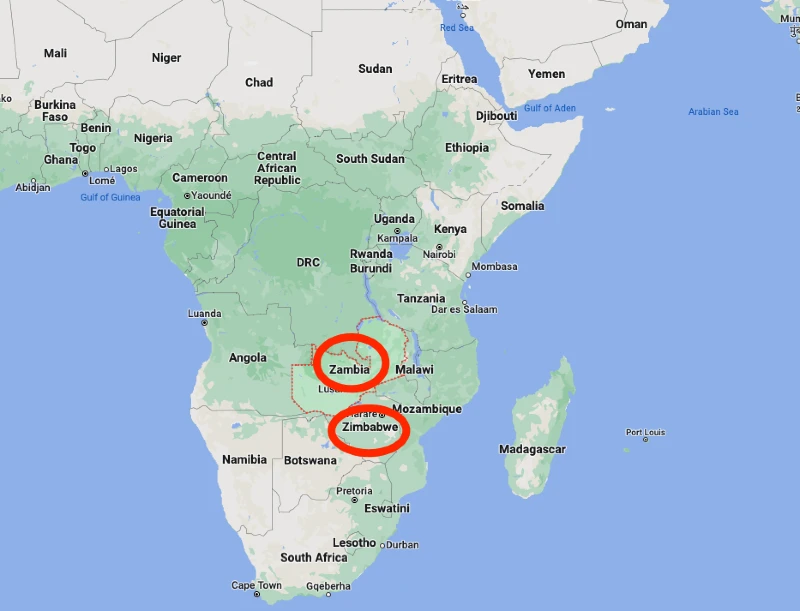Only two countries in the world start with the letter ‘Z’: Zambia and Zimbabwe. They’re both located in Africa.
Contents
Zambia
Zambia, officially known as the Republic of Zambia, is a country without a coastline in Africa. It’s located where the crossroads of Central, Southern, and East Africa come together.
It shares borders with several countries including the Democratic Republic of the Congo, Tanzania, Malawi, Zimbabwe, Mozambique, Namibia, Botswana, and Angola. The capital city is Lusaka, situated in the south-central part of the country.
What Zambia is Famous For
Zambia is famous for having a lot of natural resources like minerals, animals, forestry, fresh water, and farmable land. It’s also known for its rich cultural history, being home to the magnificent Victoria Falls (locally known as “Mosi-o-Tunya” or “thundering smoke”), and its role in regional diplomacy.
Historical Overview
Zambia’s history is rich and diverse, with early inhabitants being the Khoisan people, followed by the Bantu expansion in the 13th century. The region was colonized by the British in the late 19th century, forming Northern Rhodesia. Zambia gained independence from the United Kingdom on October 24, 1964, and has since become a multi-party state with peaceful transitions of power.
Size, Population, and Other Details
- Size: Zambia covers an area of 752,617 square kilometers (290,587 square miles), making it the 38th largest country in the world.
- Population: As of 2023, the estimated population is 20,216,029, ranking 63rd in the world.
- Language: The official language is English, and there are several recognized regional languages.
- Economy: The GDP (PPP) in 2019 was estimated at $75.857 billion, with a per capita income of $4,148. In 2010, the World Bank said that Zambia was one of the countries that made the quickest economic improvements.
- Currency: The currency used is the Zambian kwacha (ZMW).
- Time Zone: Zambia operates on UTC+2 (CAT).
- Driving Side: People drive on the left side of the road in Zambia.
- Calling Code: The international telephone code for Zambia is +260.
- Internet TLD: The top-level domain for Zambia is .zm.
Zimbabwe
Zimbabwe, officially known as the Republic of Zimbabwe, is a landlocked country in Southern Africa. It’s renowned for its ancient city-state of Great Zimbabwe, which was a major African trade center by the 11th century. The country’s name stems from a Shona term meaning “houses of stones.”
Zimbabwe is also famous for its natural beauty and archaeological sites, including the Victoria Falls, and various national parks that host a diverse range of wildlife.
Zimbabwe is a landlocked country in Southern Africa, surrounded by Botswana, Zambia, and Mozambique. The capital and largest city is Harare.
- Size: The total area of Zimbabwe is 390,757 square kilometers (150,872 square miles), making it the 60th largest country in the world.
- Population: As of 2023, the estimated population is 15,418,674.
- Languages: Zimbabwe has 16 official languages, including English, Shona, and Ndebele.
- Ethnic Groups: The largest ethnic group is the Shona, making up 80% of the population, followed by the Northern Ndebele and other smaller minorities.
- History: Zimbabwe’s history dates back to the 9th century, with the establishment of the city-state of Great Zimbabwe. It was colonized by the British South Africa Company in the 1880s and declared independence as Rhodesia in 1965. After a civil war and negotiations, Zimbabwe gained legal independence in 1980.
- Economy: The GDP (PPP) for 2023 is estimated at $42.4 billion, ranking 131st in the world. The country has faced severe economic challenges, including hyperinflation, a decline in agricultural exports, and international sanctions. The collapse of the economy led to widespread poverty and emigration.
- Telephone Code: The calling code for Zimbabwe is +263.
- Internet TLD: The top-level domain for Zimbabwe is .zw.
Final Thought
The exploration of Zambia and Zimbabwe, the two countries that begin with the letter ‘Z’, offers a fascinating glimpse into the rich tapestry of African culture, history, and geography. Both countries, though distinct in many aspects, share a common heritage and are home to some of the continent’s most breathtaking natural wonders, such as the Victoria Falls.
